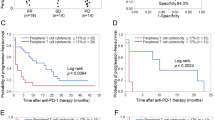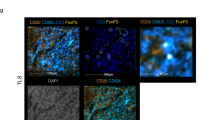Abstract
Plasmacytoid dendritic cells (pDCs) represent a subset of antigen-presenting cells that play an ambivalent role in cancer immunity. Here, we investigated the clinical significance of circulating pDCs and their interaction with tumor-specific T cell responses in patients with non-small cell lung cancer (NSCLC, n = 126) . The relation between intratumoral pDC signature and immune checkpoint inhibitors efficacy was also evaluated. Patients with NSCLC had low level but activated phenotype pDC compared to healthy donors. In overall population, patients with high level of pDC (pDChigh) had improved overall survival (OS) compared to patients with pDClow, median OS 30.4 versus 20.7 months (P = 0.013). This clinical benefit was only observed in stage I to III patients, but not in metastatic disease. We showed that patients harboring pDChigh profile had high amount of Th1-diffentiation cytokine interleukin-12 (IL-12) in blood and had functional T cells directed against a broad range of tumor antigens. Furthermore, a high pDC signature in the tumor microenvironment was associated with improved clinical outcome in patients treated with anti-PD-(L)1 therapy. Overall, this study showed that circulating pDChigh is associated with long-term OS in NSCLC and highlighted the predictive value of intratumor pDC signature in the efficacy of immune checkpoint inhibitors.





Similar content being viewed by others
References
Hiam-Galvez KJ, Allen BM, Spitzer MH (2021) Systemic immunity in cancer. Nat Rev Cancer 21:345–359
Spitzer MH, Carmi Y, Reticker-Flynn NE, Kwek SS, Madhireddy D, Martins MM et al (2017) Systemic immunity is required for effective cancer immunotherapy. Cell 168:487-502.e15
Binnewies M, Mujal AM, Pollack JL, Combes AJ, Hardison EA, Barry KC et al (2019) Unleashing type-2 dendritic cells to drive protective antitumor CD4+ T cell immunity. Cell 177:556-571.e16
Cancel J-C, Crozat K, Dalod M, Mattiuz R (2019) Are conventional type 1 dendritic cells critical for protective antitumor immunity and how? Front Immunol 10:9
Villani A-C, Satija R, Reynolds G, Sarkizova S, Shekhar K, Fletcher J et al (2017) Single-cell RNA-seq reveals new types of human blood dendritic cells, monocytes, and progenitors. Science 356:eaah4573
Lande R, Gilliet M (2010) Plasmacytoid dendritic cells: key players in the initiation and regulation of immune responses. Ann N Y Acad Sci 1183:89–103
Swiecki M, Colonna M (2015) The multifaceted biology of plasmacytoid dendritic cells. Nat Rev Immunol 15:471–485
Tel J, Aarntzen EHJG, Baba T, Schreibelt G, Schulte BM, Benitez-Ribas D et al (2013) Natural human plasmacytoid dendritic cells induce antigen-specific T-cell responses in melanoma patients. Cancer Res 73:1063–1075
Bol KF, Schreibelt G, Rabold K, Wculek SK, Schwarze JK, Dzionek A et al (2019) The clinical application of cancer immunotherapy based on naturally circulating dendritic cells. J Immunother Cancer 7:109
Mitchell D, Chintala S, Dey M (2018) Plasmacytoid dendritic cell in immunity and cancer. J Neuroimmunol 322:63–73
Conrad C, Gregorio J, Wang Y-H, Ito T, Meller S, Hanabuchi S et al (2012) Plasmacytoid dendritic cells promote immunosuppression in ovarian cancer via ICOS costimulation of Foxp3(+) T-regulatory cells. Cancer Res 72:5240–5249
Wculek SK, Cueto FJ, Mujal AM, Melero I, Krummel MF, Sancho D (2020) Dendritic cells in cancer immunology and immunotherapy. Nat Rev Immunol 20:7–24
Nam J-H, Lee J-H, Choi S-Y, Jung N-C, Song J-Y, Seo H-G et al (2021) Functional ambivalence of dendritic cells: tolerogenicity and immunogenicity. Int J Mol Sci 22:4430
Kini Bailur J, Gueckel B, Pawelec G (2016) Prognostic impact of high levels of circulating plasmacytoid dendritic cells in breast cancer. J Transl Med 14:151
Chevolet I, Speeckaert R, Schreuer M, Neyns B, Krysko O, Bachert C et al (2015) Clinical significance of plasmacytoid dendritic cells and myeloid-derived suppressor cells in melanoma. J Transl Med 13:9
Lee YS, Radford KJ (2019) Chapter three—the role of dendritic cells in cancer. In: Lhuillier C, Galluzzi L (eds) Immunobiology of dendritic cells part A. Academic Press, New York, pp 123–178
Sosa Cuevas E, Ouaguia L, Mouret S, Charles J, De Fraipont F, Manches O et al (2020) BDCA1+ cDC2s, BDCA2+ pDCs and BDCA3+ cDC1s reveal distinct pathophysiologic features and impact on clinical outcomes in melanoma patients. Clin Transl Immunol 9:e1190
Laheurte C, Dosset M, Vernerey D, Boullerot L, Gaugler B, Gravelin E et al (2019) Distinct prognostic value of circulating anti-telomerase CD4+ Th1 immunity and exhausted PD-1+/TIM-3+ T cells in lung cancer. Br J Cancer 121:405–416
Nardin C, Laheurte C, Puzenat E, Boullerot L, Ramseyer M, Marguier A et al (2021) Naturally occurring telomerase-specific CD4 T-cell immunity in melanoma. J Investig Dermatol 142:435–444
Kim S, François E, André T, Samalin E, Jary M, El Hajbi F et al (2018) Docetaxel, cisplatin, and fluorouracil chemotherapy for metastatic or unresectable locally recurrent anal squamous cell carcinoma (Epitopes-HPV02): a multicentre, single-arm, phase 2 study. Lancet Oncol 19:1094–1106
Safi S, Yamauchi Y, Rathinasamy A, Stamova S, Eichhorn M, Warth A et al (2017) Functional T cells targeting tumor-associated antigens are predictive for recurrence-free survival of patients with radically operated non-small cell lung cancer. Oncoimmunology 6:e1360458
Tatsumi T, Kierstead LS, Ranieri E, Gesualdo L, Schena FP, Finke JH et al (2002) Disease-associated bias in T helper type 1 (Th1)/Th2 CD4(+) T cell responses against MAGE-6 in HLA-DRB10401(+) patients with renal cell carcinoma or melanoma. J Exp Med 196:619–628
Peng S, Trimble C, Wu L, Pardoll D, Roden R, Hung C-F et al (2007) HLA-DQB1*02-restricted HPV-16 E7 peptide-specific CD4+ T-cell immune responses correlate with regression of HPV-16-associated high-grade squamous intraepithelial lesions. Clin Cancer Res Off J Am Assoc Cancer Res 13:2479–2487
Dhodapkar KM, Gettinger SN, Das R, Zebroski H, Dhodapkar MV (2013) SOX2-specific adaptive immunity and response to immunotherapy in non-small cell lung cancer. Oncoimmunology 2:e25205
Janssen N, Fortis SP, Speigl L, Haritos C, Sotiriadou NN, Sofopoulos M et al (2017) Peripheral T cell responses to tumour antigens are associated with molecular, immunogenetic and cellular features of breast cancer patients. Breast Cancer Res Treat 161:51–62
Godet Y, Fabre E, Dosset M, Lamuraglia M, Levionnois E, Ravel P et al (2012) Analysis of spontaneous tumor-specific CD4 T-cell immunity in lung cancer using promiscuous HLA-DR telomerase-derived epitopes: potential synergistic effect with chemotherapy response. Clin Cancer Res Off J Am Assoc Cancer Res 18:2943–2953
Laheurte C, Galaine J, Beziaud L, Dosset M, Kerzerho J, Jacquemard C et al (2016) Immunoprevalence and magnitude of HLA-DP4 versus HLA-DR-restricted spontaneous CD4(+) Th1 responses against telomerase in cancer patients. Oncoimmunology 5:e1137416
Moodie Z, Price L, Gouttefangeas C, Mander A, Janetzki S, Löwer M et al (2010) Response definition criteria for ELISPOT assays revisited. Cancer Immunol Immunother CII 59:1489–1501
Lecuelle J, Favier L, Fraisse C, Lagrange A, Kaderbhai C, Boidot R et al (2022) MER4 endogenous retrovirus correlated with better efficacy of anti-PD1/PD-L1 therapy in non-small cell lung cancer. J Immunother Cancer 10:e004241
Poropatich K, Dominguez D, Chan W-C, Andrade J, Zha Y, Wray B et al (2020) OX40+ plasmacytoid dendritic cells in the tumor microenvironment promote antitumor immunity. J Clin Investig 130:3528–3542
Siegal FP, Kadowaki N, Shodell M, Fitzgerald-Bocarsly PA, Shah K, Ho S et al (1999) The nature of the principal type 1 interferon-producing cells in human blood. Science 284:1835–1837
Bray F, Ferlay J, Soerjomataram I, Siegel RL, Torre LA, Jemal A (2018) Global cancer statistics 2018: GLOBOCAN estimates of incidence and mortality worldwide for 36 cancers in 185 countries. CA Cancer J Clin 68:394–424
Failli A, Legitimo A, Orsini G, Romanini A, Consolini R (2013) Numerical defect of circulating dendritic cell subsets and defective dendritic cell generation from monocytes of patients with advanced melanoma. Cancer Lett 337:184–192
Lauret Marie Joseph E, Laheurte C, Jary M, Boullerot L, Asgarov K, Gravelin E et al (2020) Immunoregulation and clinical implications of ANGPT2/TIE2+ M-MDSC signature in non-small cell lung cancer. Cancer Immunol Res 8:268–279
Charles J, Di Domizio J, Salameire D, Bendriss-Vermare N, Aspord C, Muhammad R et al (2010) Characterization of circulating dendritic cells in melanoma: role of CCR6 in plasmacytoid dendritic cell recruitment to the tumor. J Investig Dermatol 130:1646–1656
Lenahan C, Avigan D (2006) Dendritic cell defects in patients with cancer: mechanisms and significance. Breast Cancer Res BCR 8:101
Beckebaum S, Zhang X, Chen X, Yu Z, Frilling A, Dworacki G et al (2004) Increased levels of interleukin-10 in serum from patients with hepatocellular carcinoma correlate with profound numerical deficiencies and immature phenotype of circulating dendritic cell subsets. Clin Cancer Res Off J Am Assoc Cancer Res 10:7260–7269
Salio M, Cella M, Vermi W, Facchetti F, Palmowski MJ, Smith CL et al (2003) Plasmacytoid dendritic cells prime IFN-gamma-secreting melanoma-specific CD8 lymphocytes and are found in primary melanoma lesions. Eur J Immunol 33:1052–1062
Gardner A, Ruffell B (2016) Dendritic cells and cancer immunity. Trends Immunol 37:855–865
Kadowaki N, Antonenko S, Lau JY, Liu YJ (2000) Natural interferon alpha/beta-producing cells link innate and adaptive immunity. J Exp Med 192:219–226
Noubade R, Majri-Morrison S, Tarbell KV (2019) Beyond cDC1: emerging roles of DC crosstalk in cancer immunity. Front Immunol 10:1014
Faith A, Peek E, McDonald J, Urry Z, Richards DF, Tan C et al (2007) Plasmacytoid dendritic cells from human lung cancer draining lymph nodes induce Tc1 responses. Am J Respir Cell Mol Biol 36:360–367
Mathan TSMM, Figdor CG, Buschow SI (2013) Human plasmacytoid dendritic cells: from molecules to intercellular communication network. Front Immunol 4:372
Marciscano AE, Anandasabapathy N (2021) The role of dendritic cells in cancer and anti-tumor immunity. Semin Immunol 52:101481
Zhang S, Chopin M, Nutt SL (2021) Type 1 conventional dendritic cells: ontogeny, function, and emerging roles in cancer immunotherapy. Trends Immunol 42:1113–1127
Eisenbarth SC (2019) Dendritic cell subsets in T cell programming: location dictates function. Nat Rev Immunol 19:89–103
Mayoux M, Roller A, Pulko V, Sammicheli S, Chen S, Sum E et al (2020) Dendritic cells dictate responses to PD-L1 blockade cancer immunotherapy. Sci Transl Med 12:eaav7431
Oshi M, Newman S, Tokumaru Y, Yan L, Matsuyama R, Kalinski P et al (2020) Plasmacytoid dendritic cell (pDC) infiltration correlate with tumor infiltrating lymphocytes, cancer immunity, and better survival in triple negative breast cancer (TNBC) more strongly than conventional dendritic cell (cDC). Cancers 12:E3342
Kießler M, Plesca I, Sommer U, Wehner R, Wilczkowski F, Müller L et al (2021) Tumor-infiltrating plasmacytoid dendritic cells are associated with survival in human colon cancer. J Immunother Cancer 9:e001813
Acknowledgements
We thank all patients who contributed to this study. We thank all of the medical doctors and nurses, from oncologic department of University Hospital of Besançon and European Georges Pompidou hospital in Paris, for their contributions. The authors also thank the Biomonitoring platform (EFS, CIC-1431) for their technical support.
Funding
This work was supported by grants from, La Ligue Contre le Cancer Grand Est 2020, the Conseil Regional de Franche-Comte, INCa-PLBio-2018.
Author information
Authors and Affiliations
Contributions
OA was involved in conceptualization and acquired the funding; OA, BG, PS and CL were responsible for methodology; CL, EG, AR, LB and MM acquired the data; CL, ES, AM, BL and OA carried out formal analysis and investigation; JL, CT, FG conducted RNA-Seq analysis. CL and OA wrote and prepared the original draft; FG, CL and OA wrote, reviewed and edited the manuscript; OA contributed to supervision.
Corresponding author
Ethics declarations
Conflict of interest
The authors have no potential conflicts of interest.
Additional information
Publisher's Note
Springer Nature remains neutral with regard to jurisdictional claims in published maps and institutional affiliations.
Supplementary Information
Below is the link to the electronic supplementary material.
Rights and permissions
Springer Nature or its licensor holds exclusive rights to this article under a publishing agreement with the author(s) or other rightsholder(s); author self-archiving of the accepted manuscript version of this article is solely governed by the terms of such publishing agreement and applicable law.
About this article
Cite this article
Laheurte, C., Seffar, E., Gravelin, E. et al. Interplay between plasmacytoid dendritic cells and tumor-specific T cells in peripheral blood influences long-term survival in non-small cell lung carcinoma. Cancer Immunol Immunother 72, 579–589 (2023). https://doi.org/10.1007/s00262-022-03271-9
Received:
Accepted:
Published:
Issue Date:
DOI: https://doi.org/10.1007/s00262-022-03271-9




